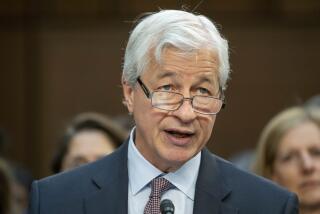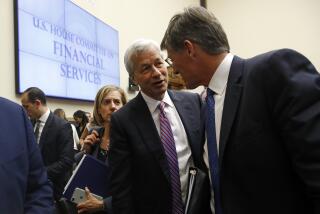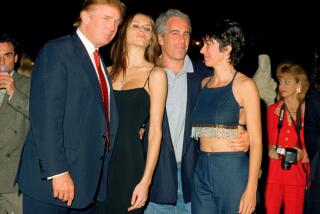Tell me again why Jamie Dimon is still chairman of JPMorgan
- Share via
The toll of JPMorgan Chase’s relentless lawbreaking under Chairman and CEO Jamie Dimon may finally be getting real for shareholders.
According to the bank’s third-quarter financial results, released Friday morning, its litigation expenses of more than $9 billion (pretax) more than wiped out its third-quarter profits -- and then some. The bank booked a loss of $380 million. In the year-earlier quarter it made a profit of $5.7 billion.
More hits from legal and regulatory problems are coming. Federal regulators are seeking a settlement over JPM’s misdeeds in the mortgage market that could be as high as $11 billion. The bank’s 2012 annual report listed legal exposure in no fewer than 19 categories, including the mortgage mess, alleged manipulation of international interest rates, involvement in the Bernie Madoff ponzi scheme, an allegedly fraudulent bond deal involving the city of Milan, Italy, and Morgan’s manipulation of the California electricity market, which I’ve documented here and here.
Federal energy regulators let the bank off with a fine that looks like a big number but really amounts to chump change for the big bank, as I observed at the time. But federal prosecutors in New York are now looking into whether Morgan employees criminally obstructed the regulators’ investigation.
And that’s not even counting the $6 billion the bank lost in poorly supervised trading in its London office, the so called “London whale” debacle. The bank last month agreed to pay nearly $1 billion in regulatory fines in connection with the episode, which Dimon dismissed when it first surfaced as “a complete tempest in a teapot.”
As the Wall Street Journal observed in May, “No large U.S. bank is operating under more regulatory sanctions” than JPM. So Dimon’s reign at JPM should be coming to an end, right?
Of course not. I’m only funnin’ ya. Dimon’s position as chairman and CEO looks more secure than ever. He easily fended off an attempt at this year’s annual meeting to force him to give up one of the two posts.
It’s not hard to see why. The bank’s shares have risen more than 61% since he became CEO in 2006--22% this year alone. This quarter’s loss is the bank’s first under Dimon. His admirers are already saying that it’s no big deal -- a one-time charge, nothing to see here, move along.
Yet Dimon’s JPMorgan has been at the center of pretty much every crisis-making scandal that has afflicted the international financial system over the last decade. There’s obviously something wrong when a bank can profit from this sort of chicanery and fraud and the ringleader gets lionized for it. (You won’t hear a discouraging word about Dimon from his claque at CNBC.)
Dimon hasn’t merely presided over this lawbreaking; he’s done almost nothing about it. No shakeup of management. Almost no changes in JPM’s board.
The problem raised by the Dimon case isn’t managerial so much as regulatory. Dimon’s continuing role is the harvest of a disciplinary system that punishes white-collar crime by exacting corporate fines, not personal responsibility. A chief executive sensitive to his moral and practical responsibility for JPMorgan’s record would voluntarily step down.
Since no one expects Dimon to do so, it’s up to the authorities to force the issue. But that approach has been off the table for years, and the harvest is JPMorgan, the outlaw. As experts in white-collar crime have pointed out repeatedly -- every time a company like JPMorgan pays a few millions, or even hundreds of millions, to paper over its misdeed -- corporate fines have no deterrent effect whatsoever.
Leaving aside that they’re always a fraction of the real costs that corporate wrongdoing imposes on customers and the general public, they impose the cost of wrongdoing on shareholders, not the responsible executives. They send a signal to all corporate executives that prosecution for fraud is just a business expense; since the potential profits from fraud are so great, why not take a flyer?
That’s been the ethos at JPMorgan under Jamie Dimon. The record shows that as long as he’s in place, more scandal will ensue. As long as he’s in place, we’ll all be paying.
More to Read
Inside the business of entertainment
The Wide Shot brings you news, analysis and insights on everything from streaming wars to production — and what it all means for the future.
You may occasionally receive promotional content from the Los Angeles Times.











